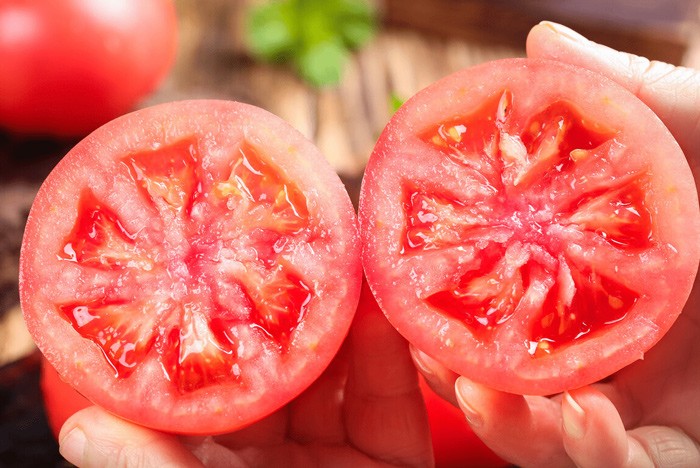Although tomatoes are generally considered a nutritious, healthy food, some people need to be cautious when consuming tomatoes and tomato products.
Tomatoes are brightly coloured, deliciously flavoured and have many health benefits. Packed with essential nutrients, including vitamins, minerals and antioxidants, tomatoes are a valuable addition to a balanced diet.
Tomatoes are used in a variety of ways including raw, cooked and as an ingredient in many dishes, sauces, drinks and salads.
Nutritional composition of tomatoes:
Tomatoes are 95% water, the remaining 5% mainly consists of carbohydrates and fiber. In 100g of raw tomatoes, there are 18 kcal, 0.9g protein, 3.9g carbs, 2.6g sugar, 1.2g fiber, 0.2g fat…
Tomatoes are rich in vitamin A, vitamin C, vitamin K, vitamin B6, folate and thiamin, potassium, manganese, magnesium, calcium, phosphorus, copper, fiber and protein.
However, people with conditions such as acid reflux, gastroesophageal reflux, irritable bowel syndrome… if eating tomatoes can make it worse.
1. People who should not eat tomatoes
Tomatoes are generally safe but can be harmful to some people with the following conditions:
1.1 Acid reflux and gastroesophageal reflux disease

People with acid reflux or gastroesophageal reflux disease should limit their intake of tomatoes.
Acid reflux and gastroesophageal reflux disease are conditions characterized by the reflux of stomach acid into the esophagus. Tomatoes are naturally acidic and can cause heartburn. Tomatoes are high in malic and citric acids, which can cause the stomach to produce too much gastric acid (which is responsible for breaking down food). When the volume of acid increases, it is forced back up into the esophagus, causing symptoms. Even cooking tomatoes can cause these symptoms.
Therefore, people with acid reflux or gastroesophageal reflux disease may feel uncomfortable or have their symptoms worsen after eating tomatoes. If you have these conditions, you should limit your tomato intake or consult a nutritionist for dietary guidance.
1.2 Irritable bowel syndrome
People with irritable bowel syndrome are often more sensitive to certain foods, including those that are high in fiber or contain sugars like fructose.
Tomatoes are also one of the most common food allergens that can cause intestinal problems. Because tomato skin and seeds are irritating, they can be a cause of irritable bowel syndrome. And if you already have irritable bowel syndrome, tomatoes can also cause bloating.
According to the World Journal of Gastroenterology, tomatoes, especially when consumed in large quantities, can be a potential trigger for digestive upset in some people with irritable bowel syndrome. People with irritable bowel syndrome should monitor their symptoms and limit their tomato intake to avoid discomfort.
1.3. Histamine Intolerance
Histamine intolerance is a condition characterized by the body’s inability to properly break down and metabolize histamine. Tomatoes are considered a moderate to high histamine food, and people with histamine intolerance may experience symptoms such as headaches, skin rashes, nasal congestion, or digestive upset after eating tomatoes.
If you suspect histamine intolerance, you should consult your doctor for appropriate dietary advice.
1.4 Kidney problems

Although nutritious and beneficial, tomatoes can also cause serious side effects in some people.
People with advanced chronic kidney disease should limit their intake of potassium, a mineral that tomatoes are rich in, according to a report released by the U.S. Department of Health and Human Services.
High levels of potassium in the blood are one of the causes of kidney disease. Therefore, people with kidney disease should avoid tomatoes, tomato sauce, or anything made from tomatoes. Tomato sauce is also high in oxalate, a natural substance that can contribute to the formation of kidney stones in susceptible people. If you have a history of kidney stones or are at risk of developing them, you should limit your tomato intake.
1.5 Allergies and Infections
Although relatively rare, some people may be allergic or sensitive to tomatoes. Symptoms of a tomato allergy usually occur shortly after eating, can range from mild to severe and may include skin rashes, itching, hives, skin irritation, eczema, coughing, sneezing, a scratchy feeling in the throat and swelling of the face, mouth and tongue or digestive upset.
Tomatoes contain a compound called histamine that can cause a number of allergic and inflammatory reactions. Tomatoes can also cause allergic contact dermatitis, which causes severe itching and swelling of the skin after touching tomatoes. Tomatoes can also cause itchy lips. Another allergic reaction that can occur to tomatoes is a rash, hives around the eyebrows and eyelids.
1.6 Gout
Gout is caused by a disorder of purine metabolism that increases uric acid in the blood. Meanwhile, tomatoes are a food that contains a fairly high purine content.
If you eat tomatoes when you have gout, it will affect your condition because the vitamin C content in tomatoes causes a precipitation reaction when it meets uric acid, which is extremely harmful to the user.
2. Alternatives to tomatoes
Although nutritious and beneficial, tomatoes can also cause serious side effects. Not everyone can consume tomatoes in the same amount because tomatoes can cause complications for some people. However, you can choose alternatives that can give the dish the same flavor and color, such as using ripe tamarinds, bell peppers, gac fruit, etc. for stir-fried dishes and soups





